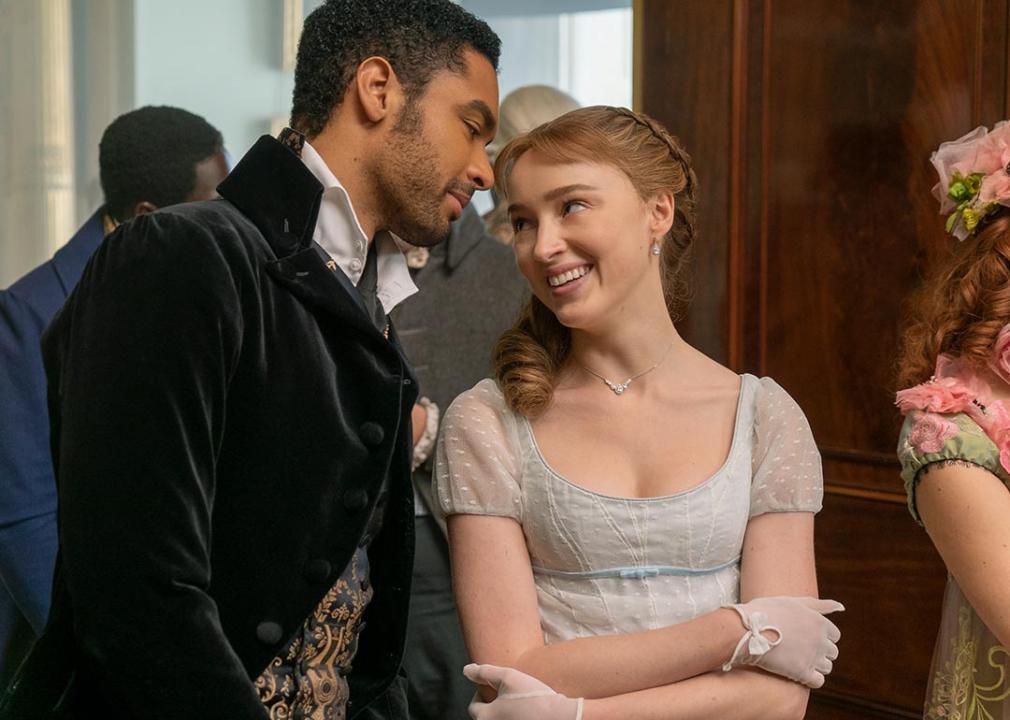An intimacy coordinator on why 'Bridgerton' has so much sex appeal

Liam Daniel // Netflix
An intimacy coordinator on why ‘Bridgerton’ has so much sex appeal
Regé-Jean Page as SIMON BASSET and Phoebe Dynevor as DAPHNE BRIDGERTON in episode 102 of BRIDGERTON.
If nothing else, “Bridgerton” has provided an answer to an interesting pop-culture question: What if “Grey’s Anatomy” super-producer Shonda Rhimes made a sophisticated Jane Austen–style period drama and stuffed it with lots and lots and lots of sex?
But the aristocratic characters on the runaway Netflix smash—which just launched its much-anticipated third season—don’t just take it all off to get it on. They share a deep passion for each other, especially in those steamy sessions between Daphne (Phoebe Dynevor) and the dashing Duke of Hastings (Regé-Jean Page) from Season 1. For the new batch of episodes, Nicola Coughlan, who plays Penelope Featherington, described her sex scenes with Luke Newton’s Colin Bridgerton: “They were intimidating to shoot, but then brilliant to shoot.”
Credit the delicate work of an on-set intimacy coordinator, who helps organize the mechanics of each sensual moment and facilitates communication between the actors and the director to ensure everyone can thrive both emotionally and artistically. “I truly believe there is always a way to tell a story within an actor’s boundaries,” says Katherine O’Keefe, a SAG-approved intimacy coordinator who started training in the profession in 2018.
The key, she adds, is to strike the right balance between class and total crass. Here, O’Keefe—who also co-hosts the “Romancing the Screen” podcast—bares all of her secrets to Backstage.
What’s your top tip for playing sexy without going over the top?
Remember that desire is reflective. Sexy is not actually skin or nudity—it’s when you can look at your scene partner like they’re the only person you want. It’s all in the eyes. If you make it so that your eyes are filled up with your need for that partner, the audience is going to read that. Look at your favorite scenes—they’re probably less raunchy than you remember because you’re remembering that feeling.
What if an actor is intimidated? What is the process?
I first talk to the director one-on-one about their vision, and then I talk to the actors one-on-one to make sure the vision lines up with their needs. Like, are you OK with going down to the underwear? Can you be nude in profile? We always find a way to keep the intention of the scene within the actors’ boundaries. And if you previously agreed to a nude scene and now you don’t want to do it because something embarrassing happened to your body, that’s fine, too! We’ll figure it out.
Do you think some form of nudity is necessary?
There’s been an odd puritanical pushback recently on this. I actually do believe that nudity and sex can be very powerful storytelling tools. Like, you can use nudity as a form of vulnerability. But it never supersedes a person’s boundaries.
What’s your favorite recent sex scene?
What sticks out is this orgy scene in “Sense8,” a Netflix show from the Wachowskis. Usually orgies are like what you see in “Eyes Wide Shut” or you’re looking at some devil-worshiping, uncivilized society. This orgy was portrayed as something positive with the characters intrinsically connected in a beautiful way.
Why do you think the sex works on “Bridgerton”?
They’re really fun in an old-fashioned way. [The scenes] don’t have the baggage of trying to be updated and modern in the 21st century; we can just watch beautiful people want each other, have relationship drama, and be in love and lust with each other.
How do you establish a scene so it doesn’t come off as smutty?
It depends on the tone of the show. I worked on “The L Word: Generation Q,“ which was known for its beautiful and visceral sex scenes. I think it added to the story. I also need to [adhere to] the [Broadcast] Standards and Practices. Pretty much anything goes on streaming shows, as long as you follow the SAG rules. But I’ve done “Grey’s Anatomy” [on ABC], and we can’t show anything beyond what we can see on a public beach. You can’t even show a sheer bra.
What’s a common mistake new actors make filming these scenes?
If I’m talking to an actor and they’re like, “It’s fine, it’s fine, it’s totally good,” I know that just means they don’t feel like they’re in a place where they can have an honest conversation with me. That’s actually harder to work with. I want to talk through what works and what doesn’t.
And it’s so common to deal with a complicated issue by just saying, “It’s fine!”
And actors are trained to do that! That “yes, and…” [mentality] is ingrained in them. But if you’re acting on the defense in a scene and trying to protect yourself because you’re not comfortable, then you can’t really act. The thing I want the most for actors is to give them the space to do their best work.
![]()
This story was produced by Backstage and reviewed and distributed by Stacker Media.
